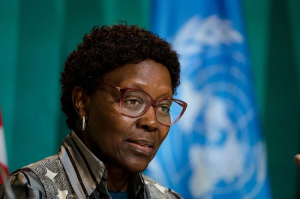There has never been a time in human history when collaboration between nations was more sorely needed than now, and there is no place that would benefit more from it than in Africa. As 54 of our Environment Ministers gather this week in Addis Ababa for the next session of the African Ministerial Conference on the Environment (AMCEN), their agendas will be packed with a long list of burning environmental issues. They will need to act in unison and with determination to achieve positive movement on these challenges.

We live in an era of climate change-induced hunger, of collapsing ecosystems – the continent’s forests are disappearing, and we face the bleak prospect of dwindling biodiversity. We experience killer floods from Senegal to Nigeria to Malawi, Mozambique to South Africa, lethal heat and fires in North Africa, and drought across East Africa, and suffocating air and plastic pollution from Cairo to Ouagadougou. As nature erodes, food security is undermined by climate-induced locust attacks, conflicts between humans and wildlife closer encounters with some species that risk the spread of deadly viruses.
But we also live in an exciting era of opportunities, one of information and innovation, and one in which African policy leadership – nationally, regionally and continentally – is increasingly cognizant of the challenges presented by the triple planetary crisis of climate change, biodiversity loss and pollution and waste. Cognizant that despite the African continent contributing the least to climate change, Africans are already facing some of the worst impacts of the climate crisis, which must be urgently addressed.
This awareness is already translated into actions, from the Tarfaya and Ras Ghareb wind farms in Morocco and Egypt, through massive solar projects in South Africa, Namibia, and Ghana, to pioneering use of geothermal energy in Kenya. Restoration initiatives like the Great Green Wall aim to halt desertification and support livelihoods across the entire width of Africa. And a majority of African governments already banned single-use plastics, albeit with mixed results.
In September, we expect leaders to convene in Nairobi for an Africa Climate Summit and in November, a meeting – also in Nairobi – will continue negotiations on a global treaty to end plastic pollution. The UN Climate Change Conference (COP28) in Dubai will cap a year of multilateral and national work to strengthen global action on climate, while one year following the historic Kunming-Montreal Global Biodiversity Framework, we’ll be closely monitoring its implementation.
At these meetings, Ministers and their governments will flesh out the details of a legally binding international agreement – will single-use plastic polluters have to own the brunt of its costs? They will address natural resources – how will the extraction of critical minerals benefit a rapid global shift away from carbonised economy, while respecting human rights and maximizing the economic benefits to resource-rich nations?
Other issues may be less contentious, but are vital for a just transition and a sustainable environment for Africans: a common African demand for climate finance and contributions for a fund for the loss and damage resulting from the climate crisis carries more weight than such a demand made by individual governments. When setting up early warning systems against extreme weather events, like those adopted decades ago in Bangladesh, it is much more beneficial to gather data across regions and even the entire continent. When it concerns biodiversity, protected areas restricted along the lines of national borders can overlook how endangered species move about and neglect conserving crucial corridors.
We are not short of forums to churn out resolutions – it is just critical that decisions already taken are implemented. The African Forum of Environment Protection Agencies is a forum to enhance the implementation of important work that is already underway.
And that must guide the ministerial meeting in Addis Ababa. As the seat of the African Union, it is the ideal location to advance a united African approach. Decades ago, Kwame Nkrumah, former President of Ghana, said: “We face neither East nor West; We face forward.”
More recently, UN Secretary-General, Antonio Guterres, similarly said of a Climate Ambition Summit next month in New York: “There will be no room for back-sliders, greenwashers, blame-shifters or repackaging of announcements of previous years.” And Kenyan President William Ruto, during the last Africa Energy Forum in Nairobi (home to the UN Environment Programme) reminded us: “This is not the time for finger-pointing and passing blame. We want to have a conversation of equals.”
To deliberate as equals is essential within Africa, as it is for when Africa’s leaders embark on engagements and partnerships beyond the continent. It means grounding positions and commitments in science and on a breadth of issues that are too important to the continent’s people to be split on.
Elizabeth Maruma Mrema, of Tanzania, is Assistant Secretary-General of the United Nations and Deputy Executive Director of the UN Environment Programme
